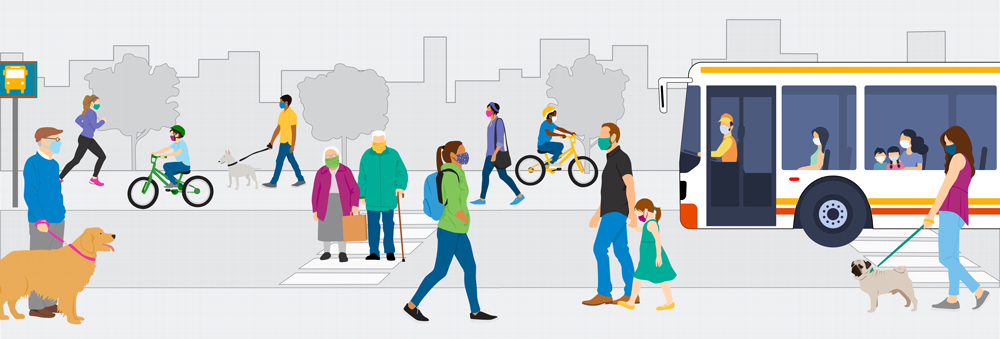Research News
Dec 22, 2023
- Human Life and Ecology
Pandemic lessons: insights into how mobility restrictions affect healthcare costs
Understanding how a restriction on walking, driving or using public transport impacts the medical costs of lifestyle-related diseases

Exploring the correlation between restriction on human mobility and the cost of lifestyle-related diseases during the COVID-19 pandemic
An increase in walking and public transit use were associated with overall reduced medical costs
Credit: Haruka Kato, Osaka Metropolitan University
Osaka, Japan - As the world grappled with lockdowns and restrictions brought by the COVID-19 pandemic, researchers at Osaka Metropolitan University conducted an extensive study to elucidate the link between changes in human mobility and the impact on medical costs associated with lifestyle-related diseases.
Dr. Haruka Kato and Professor Atsushi Takizawa of the Graduate School of Human Life and Ecology at Osaka Metropolitan University were concerned by the negative health effects resulting from the restriction of human mobility and approached the issue from a population health perspective. Using boosted tree analysis, the researchers analyzed the nonlinear relationship between human mobility types and the economic impact on lifestyle-related diseases in Japan.
The results indicated that medical costs were differently affected by walking, driving, and public transit, depending on the prefecture types. An increase in walking by over 70% reduced medical costs for lifestyle-related diseases, even during the COVID-19 pandemic. In metropolitan prefectures, the total effect on medical costs was higher for walking and public transit. In addition, medical costs decreased by increasing public transit use by over 110%. In non-metropolitan prefectures, the total effect of public transit was lower than driving, and medical costs increased from 80% to 160%. These results are significant because they indicate the standard value for each type of human mobility in metropolitan areas and non-metropolitan prefectures, offering insights and guidance for preparing for a future pandemic.
“Based on the standard values, our findings provide valuable insights for governments and policymakers. They suggest the necessity of other measures beyond restricting walking and public transit during a pandemic,” said Dr. Kato. “We also point to the need for more walkable cities and sustainable urban planning where people can live without cars and opt for public transit, especially in metropolises.”
Their findings were published in Journal of Transport & Health.
Funding
Haruka Kato received funding from JSPS KAKENHI (21K14318), Osaka City University Strategic Research Grant for young researchers (OCU-SRG2021_YR03), and Osaka Metropolitan University Strategic Research Grant for young researchers (OMU-SRPP2023_YR05). Any opinions, findings, conclusions, or recommendations expressed in this manuscript are the author's views.
Paper Information
Journal: Journal of Transport & Health, Issue 34 (2024) 101728
Title: Human mobility and medical costs of lifestyle-related diseases during the COVID-19 pandemic: A cross-sectional study in Japan
DOI: 10.1016/j.jth.2023.101728
Author: Haruka Kato, and Atsushi Takizawa
Publication date: 25 November 2023
https://doi.org/10.1016/j.jth.2023.101728
Contact
Graduate School of Human Life and Ecology
Haruka Kato
E-mail: haruka-kato[at]omu.ac.jp
*Please change [at] to @.
SDGs

